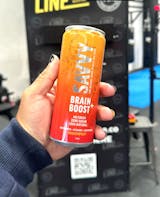brain boost is the best drink for energy that is actually healthy... i tried it at the social remedy gym event and loved it and bought some online. The guy who made it is a nutritionist and is passionate about making the best products in australia and he's really onto it
i've been on the hunt for healthy snacks with collagen for years now and so many have all these added things which make my tummy poorly. these savvy ones are totally different and are made of real foods and are so delicious... LOVE THEM SO MUCH!
This is the best purchase i made during black friday sales and i'm obsessed with this calm product... itactually works and gives me so much focus when im feeling stressed at work... seriously so good and will be buying more for my friends
Easily the best greens powder I have ever had!
I used to have AG1 but this is Australian, better quality and better value. I love how it makes me feel with the destressing formula... a total upgrade for every day.
Loved It! Amazing drink and way better than relying on coffee all day and monster at lunch!! Will be subscribing for more.
I have had so many products over the years and to find one that actually really works and does what it says it does... AMAZING. 10/10 and it tastes really great too. the savvy team are on fire
biodegradable and compostable coffee pods are hard to come by and these are amazing! The added ingredients make the effects of coffee stronger too
I’ve tried various health food bars from all over the world, and I have to say these are some of, if not the most delicious I’ve ever had.
The taste alone justifies purchasing them, however the real magic lies in the quality ingredients inside. They pack a punch you can feel, leaving you with steady focus and without any huge crash. I’ve already re-ordered.
Well done, Savvy team!
Delicious and actually amazing at reducing stress and making me feel amazing every single lunch time. Could not be more pleased with this.
monster used to be my go to until I realised I was jittery, sweaty, and yelling at spreadsheets. This is smoother, lasts longer, and I don’t feel like death afterwards
I trust nutritionists more than I trust doctors. This drink’s got more good-for-you ingredients than my weekly salad shop and it somehow keeps me sharp through long strategy meetings.
I used to smash a coffee and a Red Bull before client meetings just to stay sharp. Now I just have this nootropic drink and I’m firing on all cylinders—no crash, no jitters, and it’s actually good for me. My nutritionist wife even approves.
So this is an amazing drink and it made me swap my morning Monster for nootropics and it’s been a game-changer. No crash, no jitters—just clean, focused energy that actually helps me think clearer and stay productive. Feels like fuel for your brain instead of a sugar bomb.
I work in tech and spend most days problem solving. This gives me the edge I need to stay in the zone without relying on too much caffeine.
Im a physio and spend hours one-on-one with clients. This helps me stay mentally present and energised throughout the day without crashing like I used to after coffee. It is now a staple on my desk every morning.
I need to stay creative and focused. This helps with mental stamina and I no longer feel foggy halfway through the day.
I work in finance and the mental load can be intense. This drink helps me stay alert and make faster decisions without the wired feeling I usually get from energy drinks.
I was sceptical at first. But it actually helps with mental clarity and I dont feel as drained by lunchtime. Tastes better than I expected too.
Perfect for smashing out tasks when I'm on a deadline. Running a small business means I have to be switched on all day. This helps me think clearer and stay calm when things get hectic. Highly recommend it to other founders.
As a nurse doing shift work, I needed something to help without wrecking my sleep. This gives me clean energy and I feel less frazzled even on back-to-back shifts. This is my go-to for days when I need to think fast.
Im a high school teacher and I rely on this to keep my energy steady. My head feels clearer and I have way more patience in the afternoons which is saying something.
This is my go-to for days when I need to think fast.
An essential part of my daily focus routine now.







